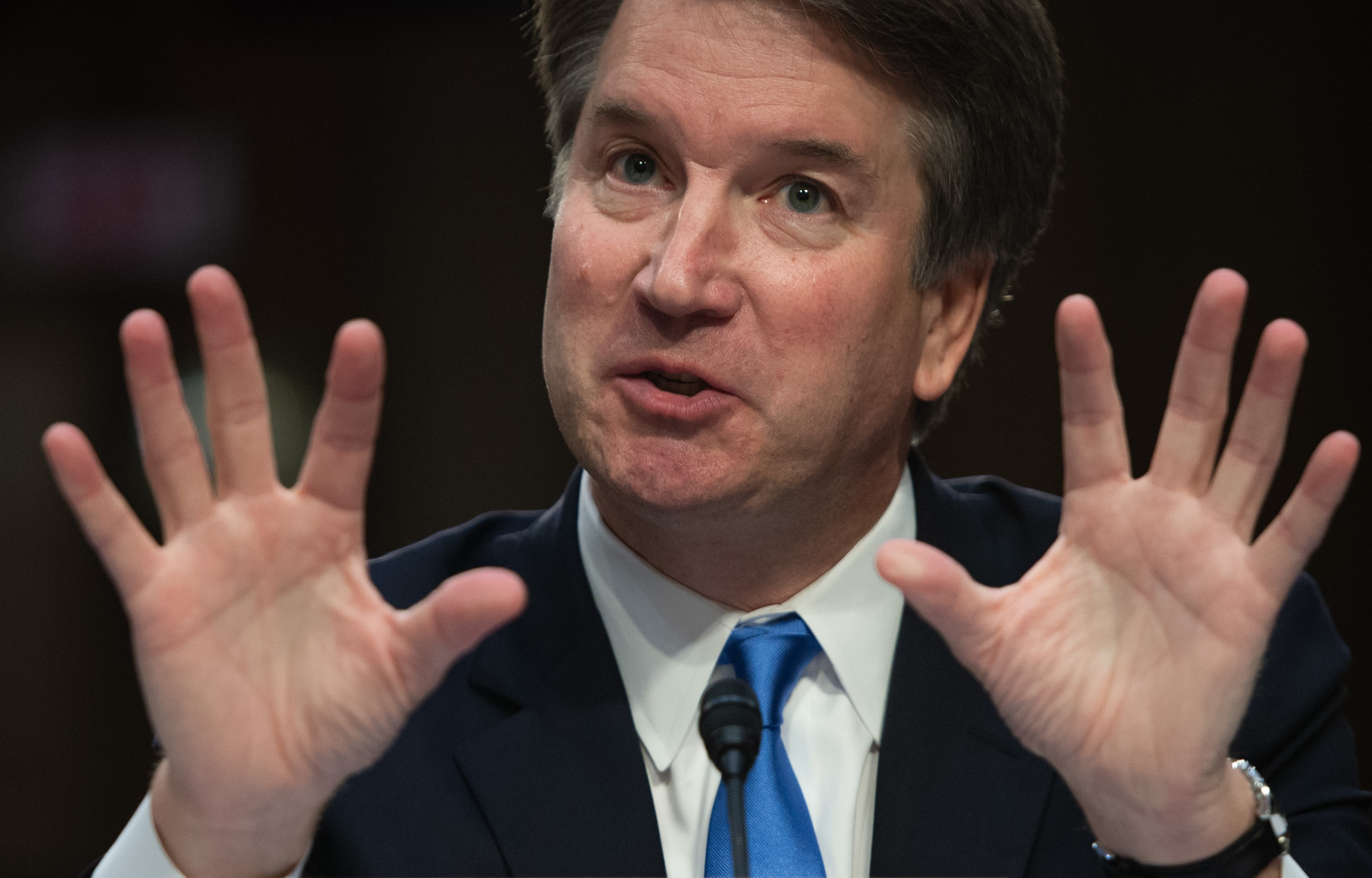Kavanaugh, in marathon hearing, is grilled on abortion, presidential power
US Supreme Court nominee Brett Kavanaugh faces a grilling on the second day of his confirmation hearing in front of the Senate Judiciary Committee (SAUL LOEB)
Washington (AFP) – President Donald Trump’s US Supreme Court nominee said Wednesday he would not let political pressure threaten his judicial independence, as he assured senators he respected the landmark legal precedent protecting abortion rights.
Through an at-times tense 12-hour session on Day 2 of Judge Brett Kavanaugh’s confirmation hearing, lawmakers grilled him over the administration’s withholding of documents from his time in the Bush White House, gun legislation, the ongoing Russia investigation and whether a sitting president can be compelled to respond to a subpoena.
The 53-year-old conservative jurist was tapped by the president to succeed retired justice Anthony Kennedy — often the swing vote on the country’s highest court — in a lifetime appointment.
Should he win confirmation, Kavanaugh would be Trump’s second nominee on the nine-member bench, and could solidify a hard-right court majority and help shape key aspects of American society for a generation.
Kavanaugh — a deeply controversial figure seen by progressives as a threat to women’s health care rights — was asked about Roe v Wade, the 1973 Supreme Court decision that protects abortion rights.
He told the Senate Judiciary Committee he considered it “settled as a precedent of the Supreme Court.”
“I don’t live in a bubble, I live in the real world,” the judge, who sits on the US Court of Appeals in Washington, assured Democrat Dianne Feinstein.
“I understand the importance of the issue.”
Trump campaigned on a promise to nominate pro-life judges and justices, and Democrats worry that Kavanaugh will seek to roll back abortion rights if he wins the backing of a straight majority in the 100-member Senate.
“Yes, of course he will” seek to gut or overturn Roe v Wade, tweeted Hillary Clinton, the 2016 Democratic presidential candidate.
Protesters repeatedly interrupted proceedings through the day. Seventy-three people were arrested by police for unlawful demonstration activities, police said.
“If you love America, stop this travesty!” boomed one woman as she was ejected.
– ‘Loyalty’ to US Constitution –
Senate Democrat Dick Durbin pressed Kavanaugh over his dissenting opinion in a 2017 case involving a pregnant undocumented immigrant. He argued that the detained 17-year-old needed to be transferred to an “immigration sponsor” before being immediately allowed an abortion.
“I did my level best in an emergency posture,” Kavanaugh said.
Democrats have also voiced concern about the nominee’s views on the scope of presidential power.
Republican Senator Orrin Hatch bluntly asked Kavanaugh what loyalty he owes Trump.
“I owe my loyalty to the Constitution,” Kavanaugh responded, holding up his tattered copy of the document.
“No one is above the law.”
Some 11 hours into the proceedings, Senator Kamala Harris launched some of the day’s toughest questioning, demanding to know whether Kavanaugh had ever spoken with anyone at the law firm of Marc Kasowitz, a personal lawyer to Trump in 2017, about the investigation being conducted by special counsel Robert Mueller.
Kavanaugh appeared caught off guard. “I’m not remembering,” he said.
“I think you’re thinking of someone and you don’t want to tell us,” Harris replied, as tensions soared.
In past comments, Kavanaugh has supported an expansion of presidential immunity from prosecution — a dramatic shift from his recommendation for strong action against then-president Bill Clinton when Kavanaugh assisted in a 1990s investigation against him.
Asked Wednesday by Feinstein whether a sitting president can be forced to respond to a subpoena, he demurred: “I can’t give you an answer on that hypothetical question.”
Kavanaugh described himself as an “independent” federal judge whose decisions are founded on law and precedent — “not based on policy, not based on political pressure.”
– Presidential immunity –
Several of his remarks appeared aimed at assuaging Democratic concerns. He portrayed himself as a “civil” judge and an admirer of the 1954 Brown v Board of Education decision that ended segregation laws, calling it “the greatest moment in Supreme Court history.”
But his refusal to divulge his position on key legal questions vexed some lawmakers including Senator Cory Booker, who when asked about the judge’s thinking on racial profiling or voter suppression was met with Kavanaugh’s argument that he looks at such issues through the lens of court precedent.
Booker insisted he was not concerned about past cases: “I’m worried about what the law is going to be when you get on the court and change these precedents.”
The hearing got off to a chaotic start Tuesday, when Democrats sought a postponement over thousands of withheld documents pertaining to Kavanaugh’s time in the George W. Bush White House.
Republicans hold a one-vote Senate majority. Should a single Republican oppose Kavanaugh, it could throw his confirmation into jeopardy, although there has been little sign that any GOP senator was prepared to buck the president.
Questioning of Kavanaugh continues Thursday.
Disclaimer: This story has not been edited by Siliconeer and is published from a syndicated feed. Siliconeer does not assume any liability for the above story. Validity of the above story is for 7 Days from original date of publishing. Content copyright AFP.


